5 days, 733 kilometers, 26 vehicles, 12 checkpoints, and a whole lot of dust. Our experience crossing overland from Iran to Pakistan, possibly the longest border crossing in the world. If you’re interested in the practical details of the journey, check out our Iran – Pakistan border crossing report.
Day 1 – 102 kilometers
Zahedan, Iran to Taftan, Pakistan
5 cars, 1 police station, 3 military bases, 1 Levies station, 2 checkpoints
We’re riding in the back of a police car in Zahedan, Iran. The two officers in front are armed with pistols. Neither is wearing a seatbelt, of course. One is shouting out the window to men on the street, the other is engrossed in leading armed forces in a battle of life and death… on his mobile. Two more officers ride behind us on a motorbike. One of them has an AK-47 strapped to his back. A true motorcade. Sebastiaan and I giggle–we’re feeling a bit like the POTUS.
Two minutes later, we transfer to a new police car to throw off our purely theoretical terroristic stalkers and/or potential kidnappers, then we are deposited in a police station. The two-hour registration process consists of two minutes of writing, one hour of men giggling about my hijab-less passport photo, and a combined 58 minutes of waffling and table tennis.
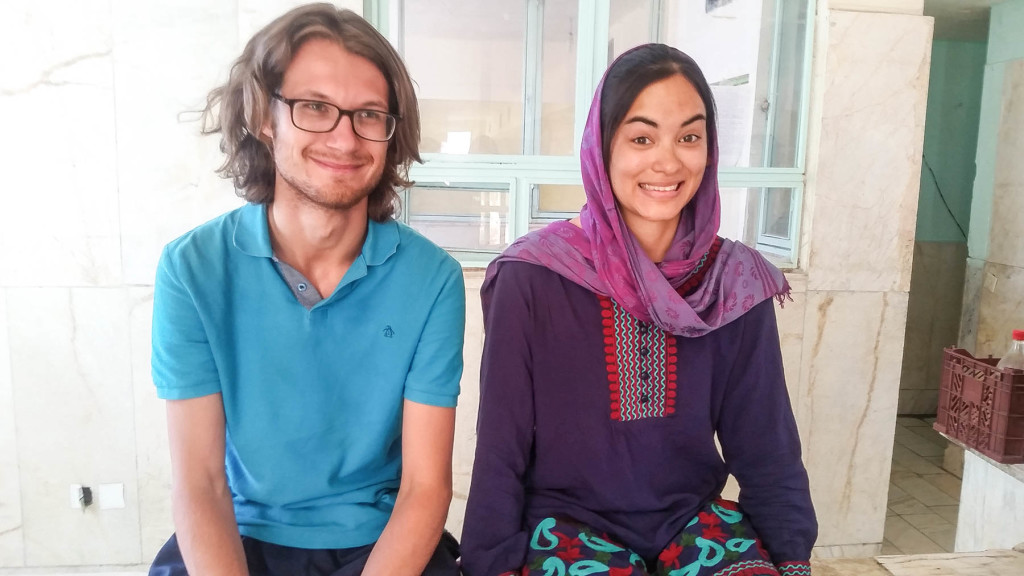
The intrepid explorers – 1. We took photos with the police, but then Big Bad Boss came and made us delete them all, and retake them minus the officers.
The intensity is kicked up a notch when our military pickup arrives. It’s an image straight out of a wartime news report–the whole squad is outfitted with AKs, and two of the men’s faces are hidden behind keffiyeh wraps. Our bags are tossed into the back of their armored pickup and we clamber in, treading carefully so as not to step on the AK-47 in the back seat, and noting with amusement that the driver’s AK fits perfectly into the side compartment of his door. Now that’s good design!
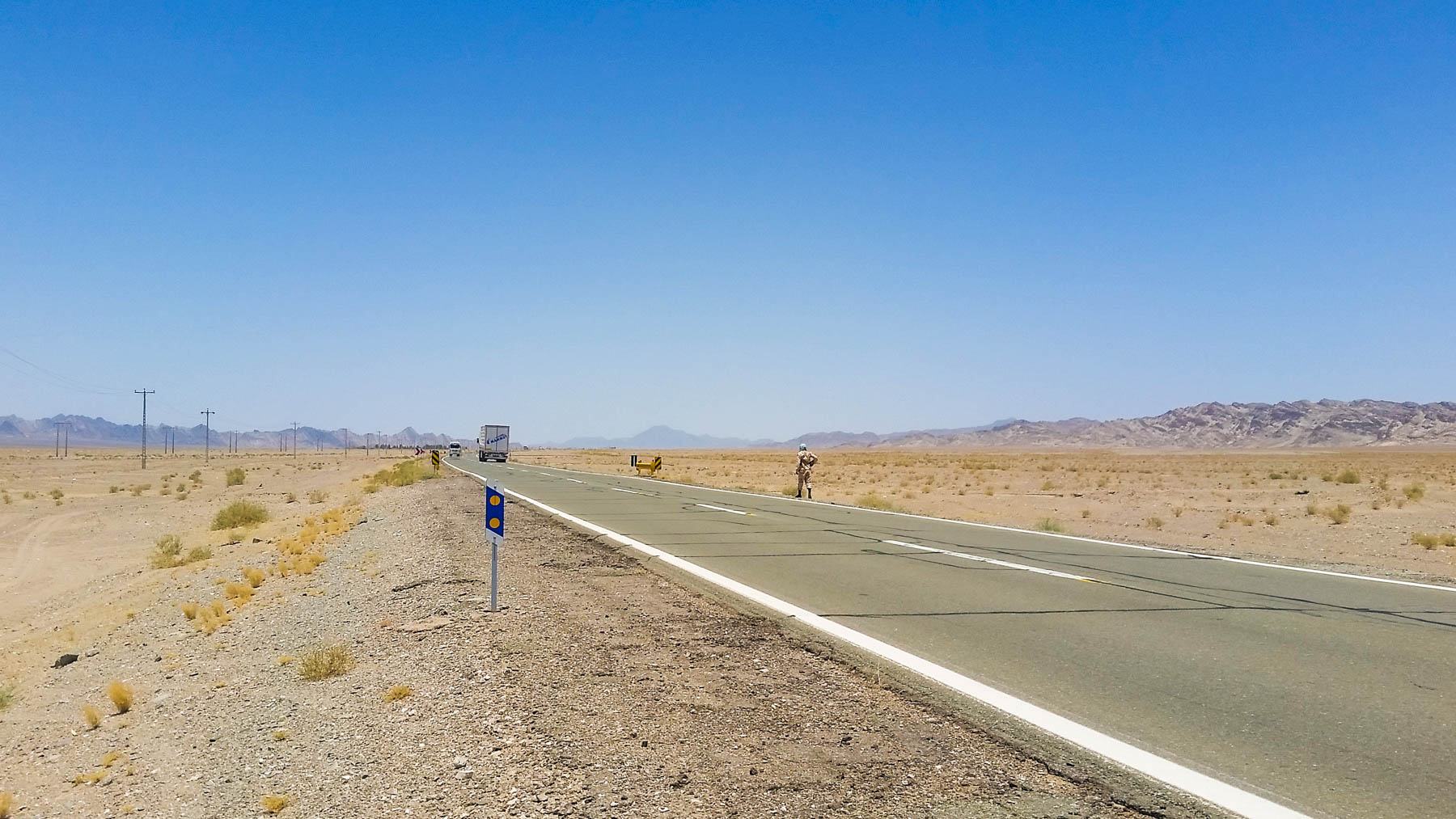
One of our escorts guarding our vehicle while the driver takes quick prayer stop along the way. Don’t tell Iran I took this.
We leapfrog from military base to military base, pickup to pickup, our passport details noted down every step of the way. Luckily, the police were thoughtful enough to delay everything so this all occurs at the hottest point in the day–nothing like a little bit of 45°C desert sunshine to brighten your border crossing. But it’s no problem–our oceans of sweat help our backpacks stick to our bodies more snugly.
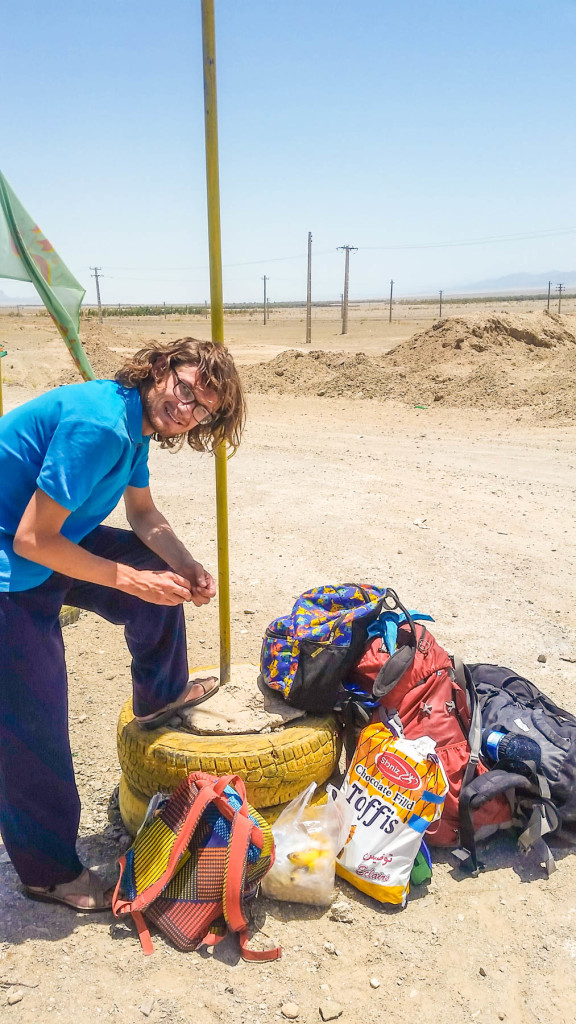
“I love sitting outside at noon in 45 degrees weather!” said no one ever. At least the sun kept our plastic bags of food nice and overly toasty.
Many hours, 5 cars, and much dust later, we are at the Iran-Pakistan border, and cross without hassle. We are now officially in Balochistan province, the wild west of Pakistan.
(Mother, if you’re reading this, skip the next part.)
Balochistan is a smorgasbord of danger: Taliban leaders are based in its capital, Quetta, it is the main route for drug smugglers running heroin and opium out of Afghanistan, and there are warring tribes amongst the native Baluchi people. Multiple buses have recently been bombed, and the drug smugglers have occasionally kidnapped foreigners to use as leverage when dealing with the police.
(You can open your eyes now, mother.)
As a foreigner, one does not simply walk onto a bus in Balochistan. To ensure safety, an armed escort is required for the entirety of the 600+ kilometer journey out of the province. The Levies, the paramilitary officers of Balochistan, are our hot escorts for this party, but we must wait at their station until our departure tomorrow.
The Levies station is a run down concrete compound comprised of jail cells and equally decrepit common rooms–our home for the day. We while away the hours with a variety of off-duty characters. One has exactly three very rotten teeth, and an affinity for watching Discovery Channel animal documentaries on the tiny old television in the common room. Another has a rich flared mustache, and proudly shows off his AK-47–“the best gun there is.” One of the men speaks a smidge of English, and walks us through the backstories of the rusty confiscated cars in the courtyard of the compound.
“That one, drug smugglers. That one filled with refugees. There, more drug smugglers. They had many guns.” He points out the multitude of bullet holes through several of the cars.
As the night grows late, we attempt to settle into home sweet home, an unused office with 0 ventilation. A fan turns above our heads, mocking our existence as it buffets hot air into our faces. Bullet Hole Bill offers an alternative: an empty jail cell filled with old wrappers and smelling faintly of piss. I thank him for taking our well being into account, and assure him we’ll be fine–our room isn’t that sweltering.
Day 2 – 291 kilometers
Taftan to Dalbandin
3 cars, 3 Levies stations, 6 checkpoints
We’re alone in the back of a pickup truck, our armed escorts in the front cabin. As we are driven out of town, I ponder a comparison between us and cattle being shipped off to slaughter:
Similarities
- We have no idea what is actually going on.
- We are covered in filth.
- We are being driven against our will.
Differences
- Our slaughter is (hopefully) not guaranteed.
- We are marginally less hairy.
- Farmers don’t carry automatic weapons.
Sandy dunes and barren wastelands speed by, and hair is whipped into a frenzied mess. Our necks begin to ache from all of the skidding and swerving as the driver dodges potholes at light speed. We try to shrink ourselves to fit the minute amount of shade available, while discussing the ways in which sitting exposed in the back of an open truck bed could possibly be safer than riding inside a bus. The phrase “shooting fish in a barrel” comes to mind.
Every so often, we must stop and register at Levies checkpoints along the road. A uniformed man of varying humor comes out to meet us at each stop, carrying a thick, handwritten logbook of all the foreigners that have passed this way.
(No, mother, we are not the only ones. I told you so.)
They have us scribble down our information, and sometimes take our photos with their old Nokia phones. At times they take one too many photos of just me, and I wonder if it’s for administrative purposes, or masturbatory material later on. Thanks to a plethora of creepy old men with mobiles, I’m practically a porn star in Iran–why not add Pakistan to my resume as well?
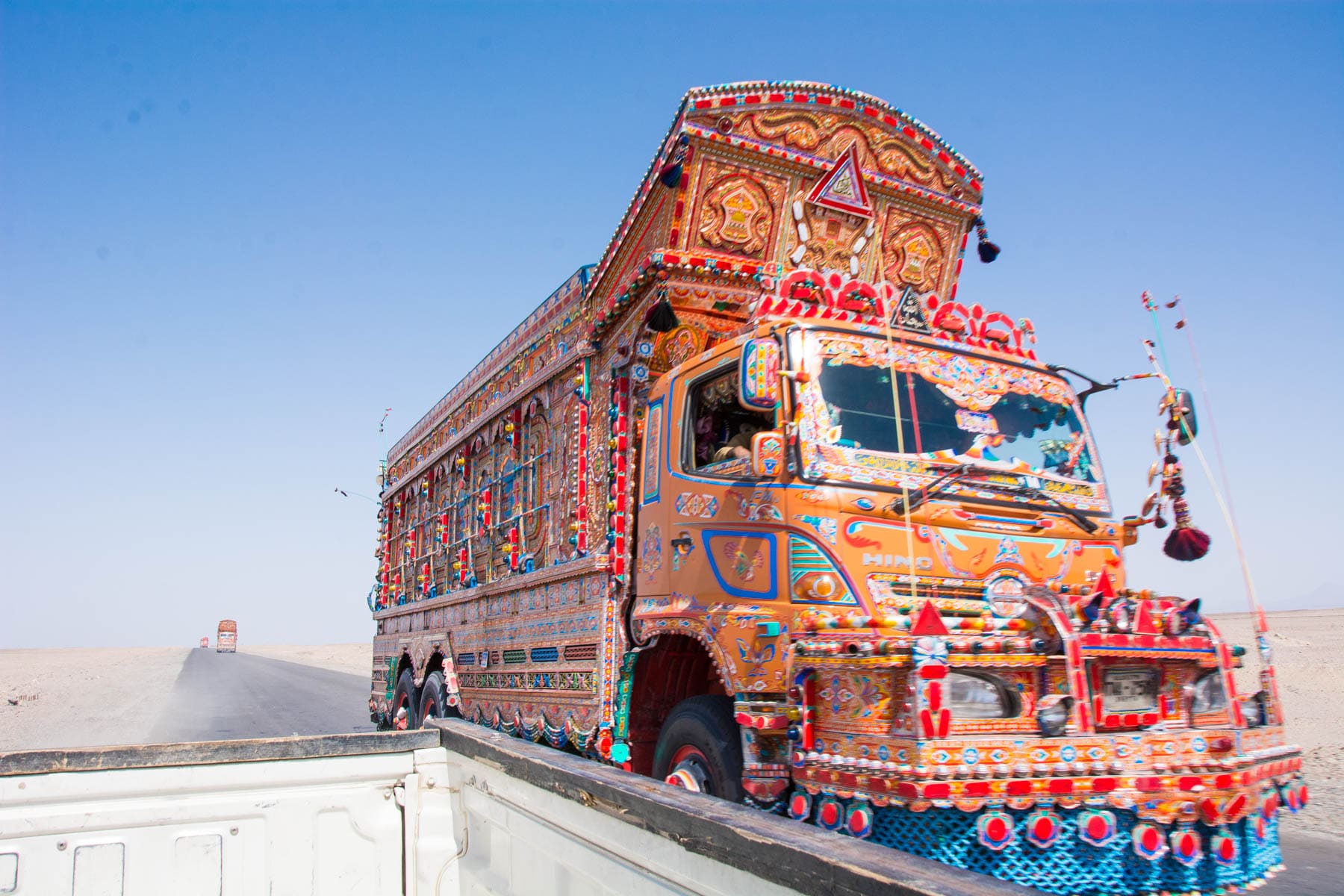
On the bright side, the trucks in Pakistan look like they’ve all taken a serious dosage of acid before getting on their way, so at least we have something to break the monotony along the way!
We drive on for hours. Our appreciation for outdated governmental systems increases as we pass through more and more checkpoints, and realize that there is not a single computer in sight. One can only fantasize about how much time we would save if our information could be entered into a computer. Never again will we mock organizations running Windows 98–at least they are running any system at all.
Approximately two seconds before our stomachs implode from hunger, the truck swerves to a stop at a small, concrete Levies shack for a break. There is absolutely nothing to see, as far as our eyes can see. We are fed a light lunch of curried something or another as one of the Levies tells us about life hunting the Taliban.
“Taliban in Afghanistan: America’s problem. Taliban in Pakistan… Pakistan’s problem.” He fingers the trigger of his AK, pupils dilated as he stares out at the harsh desert.
Like many in Pakistan, the Levies hate the Taliban. Since the attacks of 9/11, Pakistan has been involuntarily absorbed into the War on Terror. Taliban activity regularly spills over the border from Afghanistan. Bombs are detonated on buses, cities are often ravaged by suicide bombers. The Taliban is also used as a scapegoat to cover up drug-related violence in the north, further tainting Pakistan’s international reputation. Tourism to Pakistan has halted since it joined the ranks of Terrorist Countries Not To Be Visited. The Levies are the primary force for catching and dealing with Taliban activity within Balochistan. It’s easy to see why they, of all people, hate the Taliban.
Despite the dark subject, the mood lightens. They show us videos of camping while on Taliban patrol. The person setting up the tent is cursing, others are singing, and one is barbecuing. They’re no different from any other videos of a guy’s getaway… aside from the assault weapons scattered in the background.
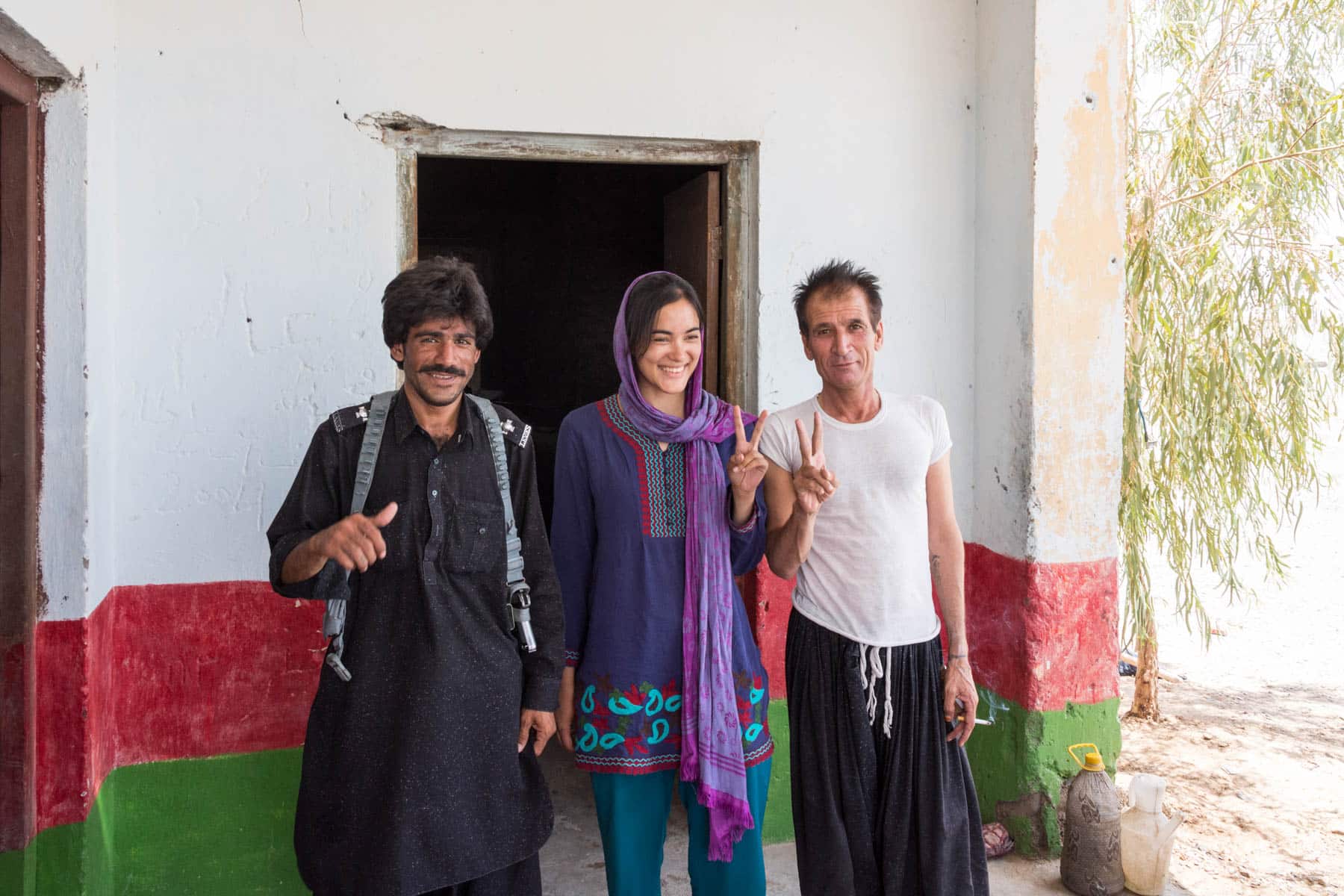
Peace and guns, man
Seven hours after our departure, we arrive in the small town of Dalbandin. Our bodies are coated in a deliciously thick layer of paste made from dust and sweat. We’re dumped in a hotel room for the night, and it is equally as scorching as the previous night. More police with more guns have arrived, and they close the door of our room to get the message across–we are under house (hotel?) arrest, and we are not to leave the building.
The police eventually allow us to get some fresh air on the roof of the building, following us like armed shadows: always present, but never in our faces. We feel a bit like mafia bosses as we survey the town below us, lords above the fray with our hired muscle to protect us from the masses.
Later on, there’s some unofficial in-house entertainment. A phenomenally drunk man is dancing around the courtyard, toppling over every once in a while as he chain smokes packs of cigarettes and cackles gleefully at us in Baluchi, the local dialect. He’s accompanied by a retarded teenager– “Alien” according to the hotel boys–who himself alternates between chain smoking and chugging Mountain Dew. At one point, the drunk steals a cigarette from Alien, who promptly pulls a switchblade from his pocket and lunges to retaliate. Some of the hotel staff grab him as our police officer bursts into hysterical laughter. Interestingly enough, the police are more concerned with the happy drunk than the angry retard with knife. Maybe he’s, like, Taliban or something.
Day 3 – 340 kilometers
Dalbandin to Quetta
14 cars, 3 Levies stations, 4 checkpoints
Our longest day begins at the earliest hour. They say we’re leaving at 8, which actually meant 6:15. They are banging on the door, saying it’s “already” 6 in the morning and we need to move. Sir yes sir! We have no choice, sir!
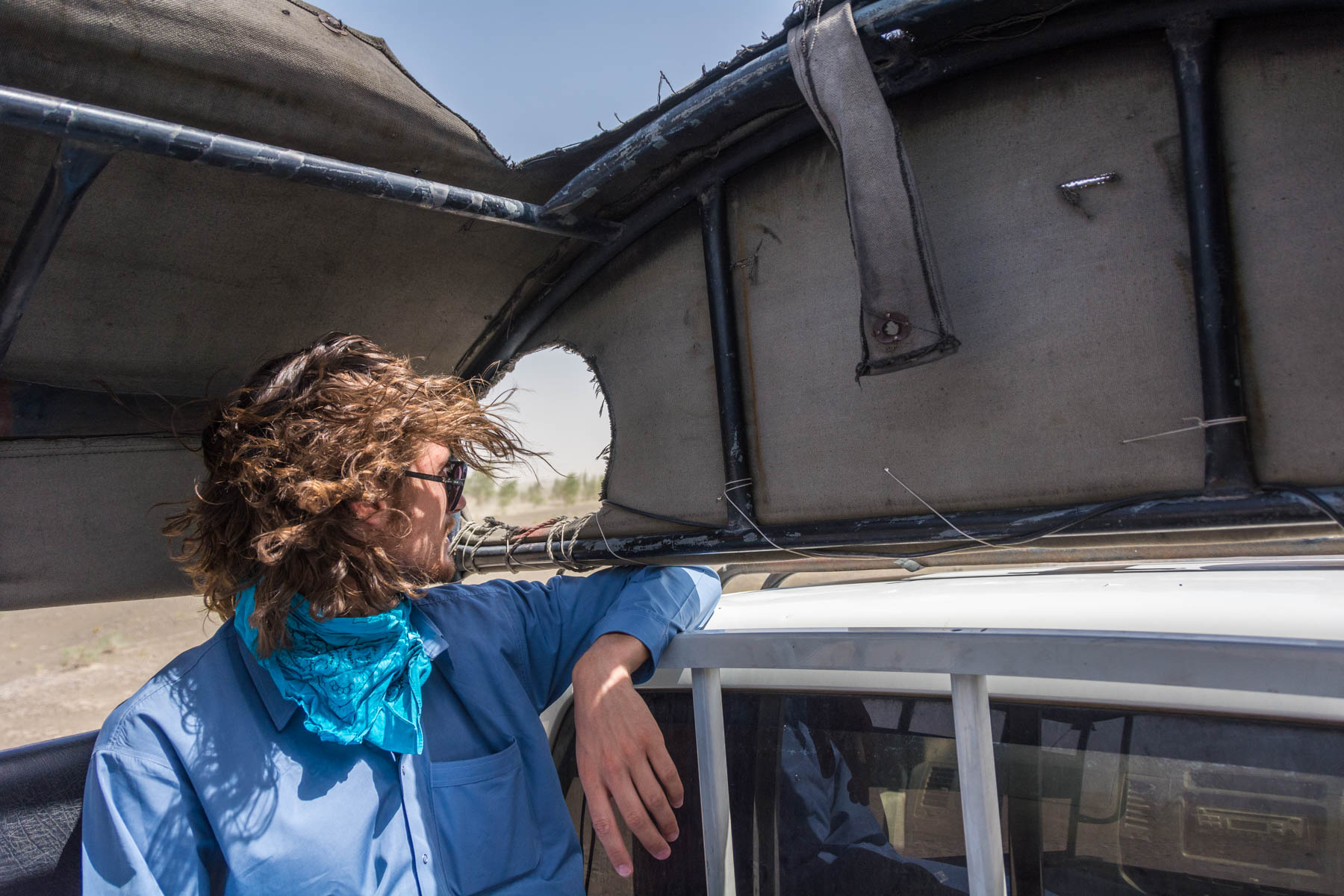
At least this very holey truck cover will protect us from the sun and dust. Oh wait.
The day is an endless cycle of climb into the truck, climb out of the truck. Forget frequent flyer miles–we should get frequent transfer miles. The day is even hotter and dustier than the one before. I compose a little ditty to the tune of “Country Road” to pass the time.
Escort us,
Levies men,
to the place
where we’re goin’:
West Pakistan,
Balochistan,
Escort us,
Levies men.
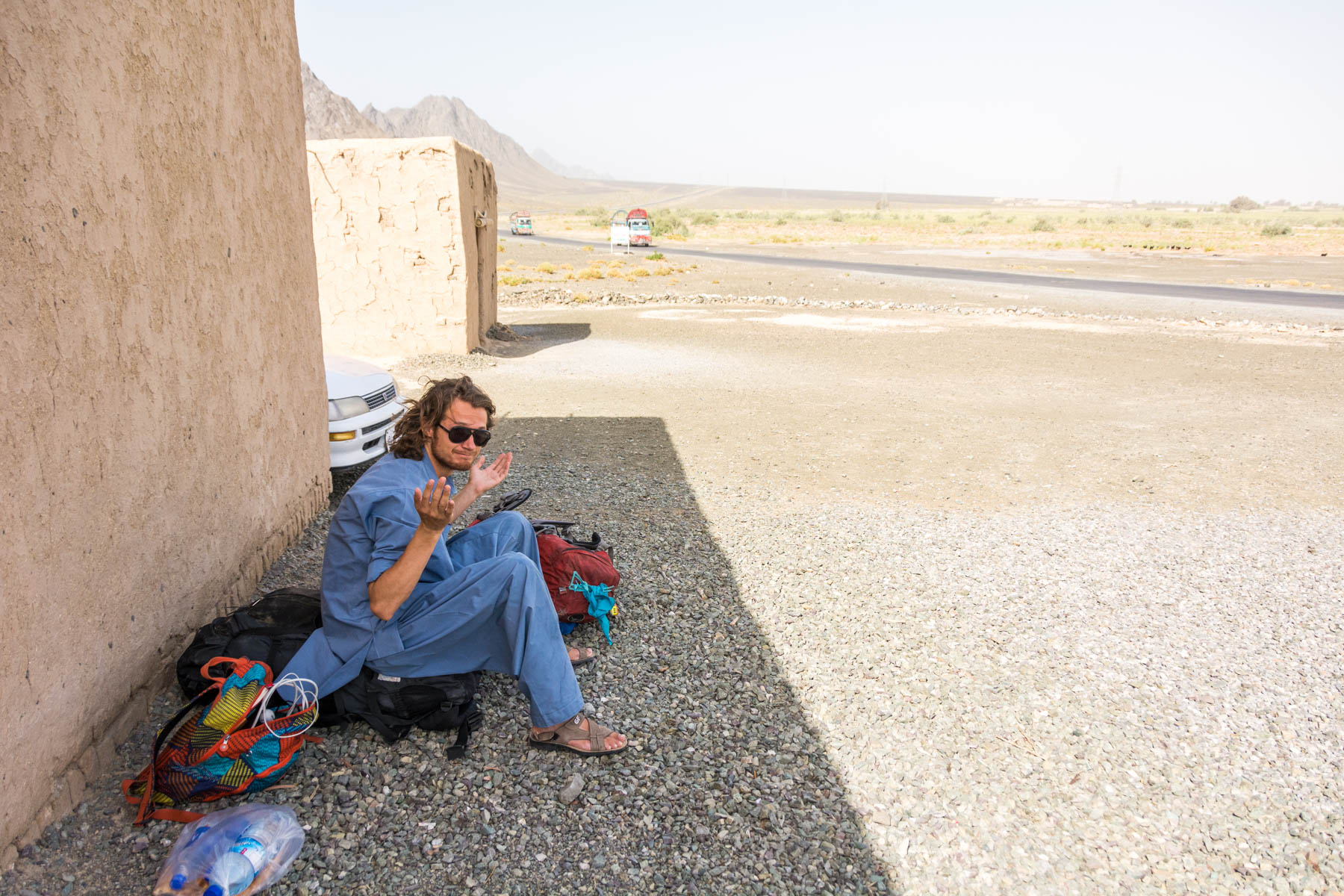
We’re also periodically left alone on the side of the road because, y’know, safety.
The Levies periodically ride in the back with us. Some are curious, and make whatever small talk their English skills allow. Some are less charming, leaving us to roast in the truck bed while they have tea and cigarettes with friends along the way. One offers to let us shoot his AK-47, but as he bangs on the back window, asking his friend to pull over for a shooting stop, the driver proves to be woefully responsible.
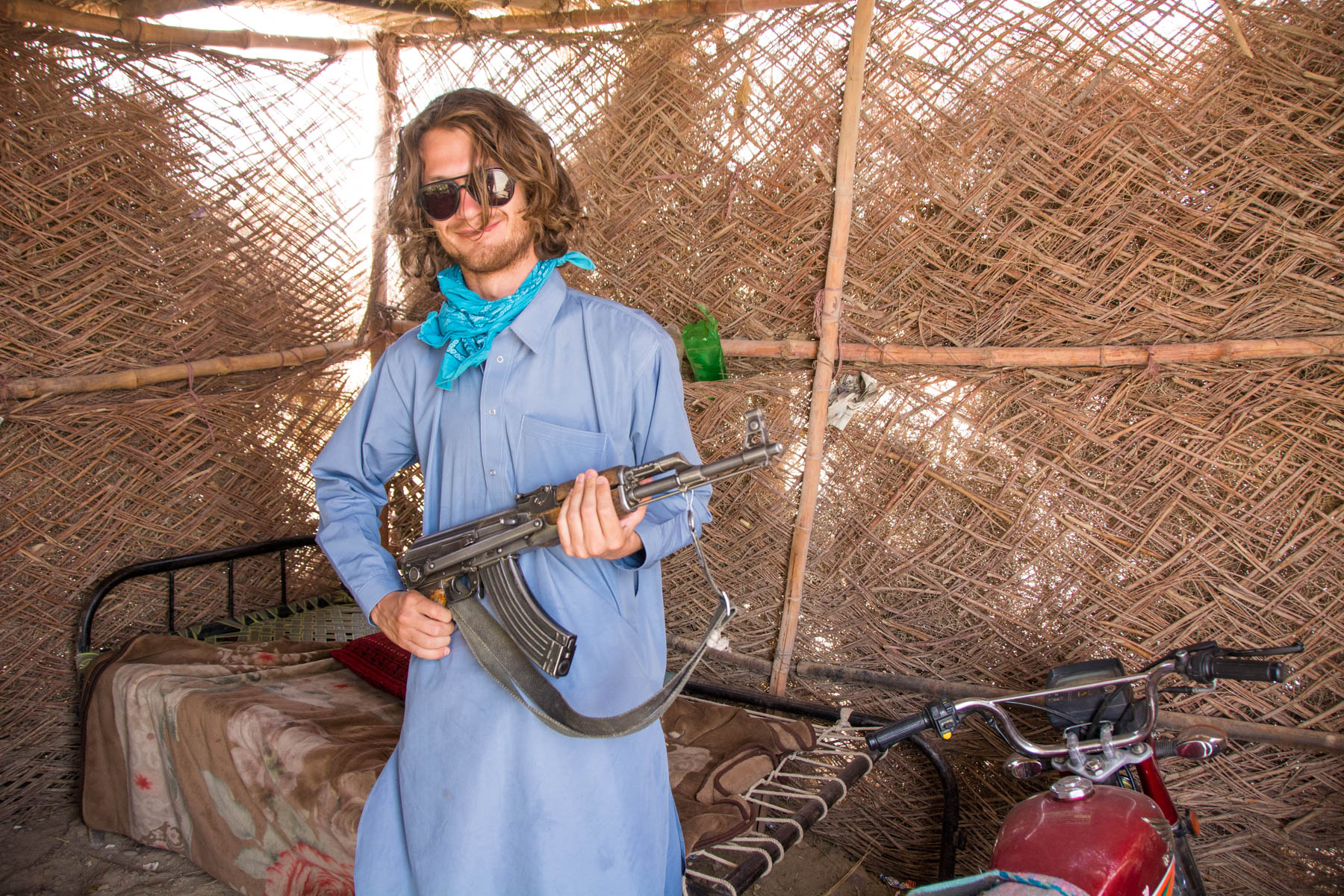
On the bright side, they let us fondle their guns try their weapons on for size.
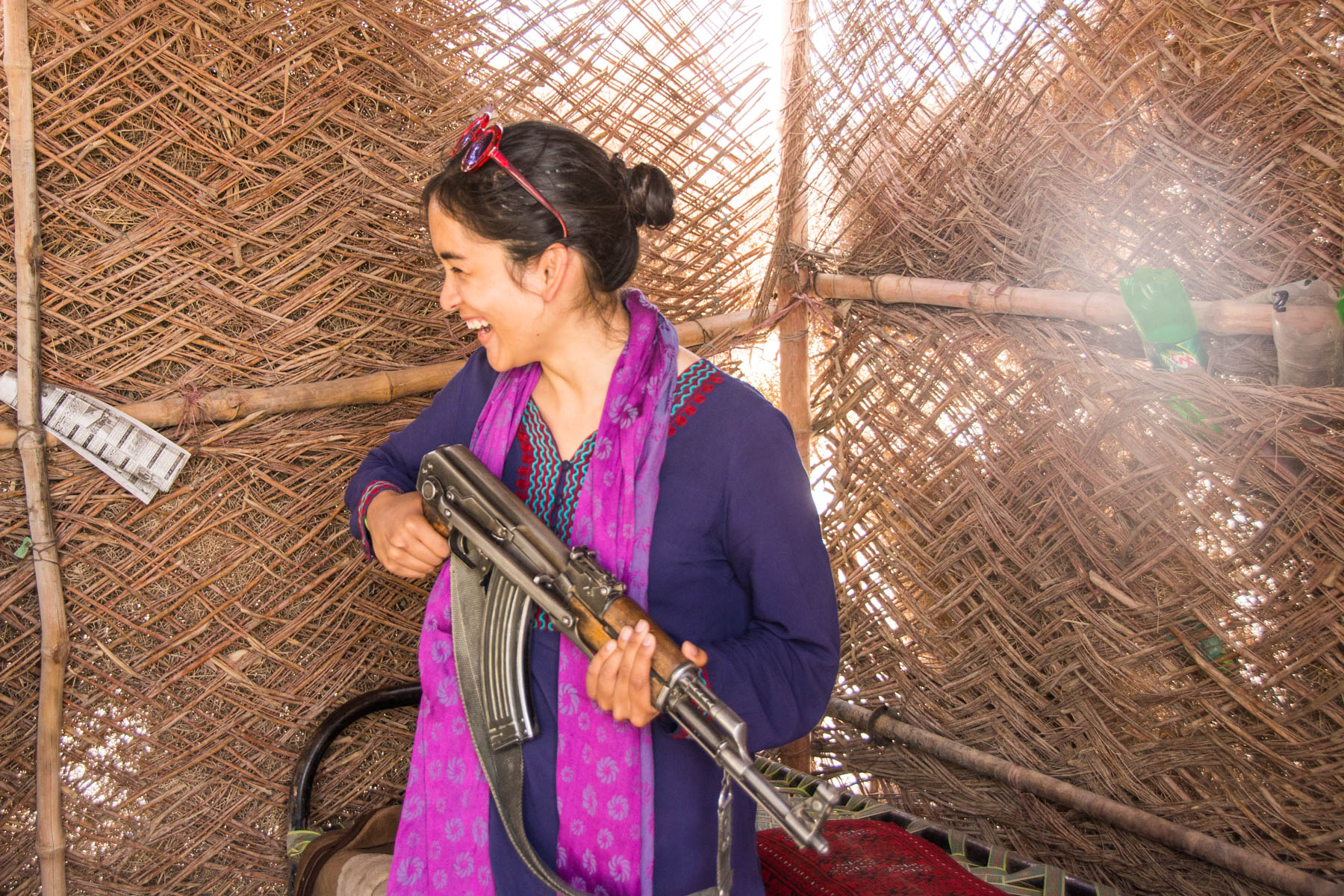
P.S. NSA, I know you’re watching. I swear I’m not secretly joining the Taliban.
Around 13:00, we enter mountains particularly close to the Afghanistan border. The officer riding looks at us grimly.
“This is dangerous area.”
We notice that his gun’s safety is off, and he rides with his finger on the trigger. He makes some small talk, but his eyes are constantly surveying the land behind us. Instead of changing cars hourly, we begin to change every 10 kilometers.
At this point, I’m too tired to care. Terrorists, you can have me. Just don’t make me change cars anymore. And get me a glass of cold water.
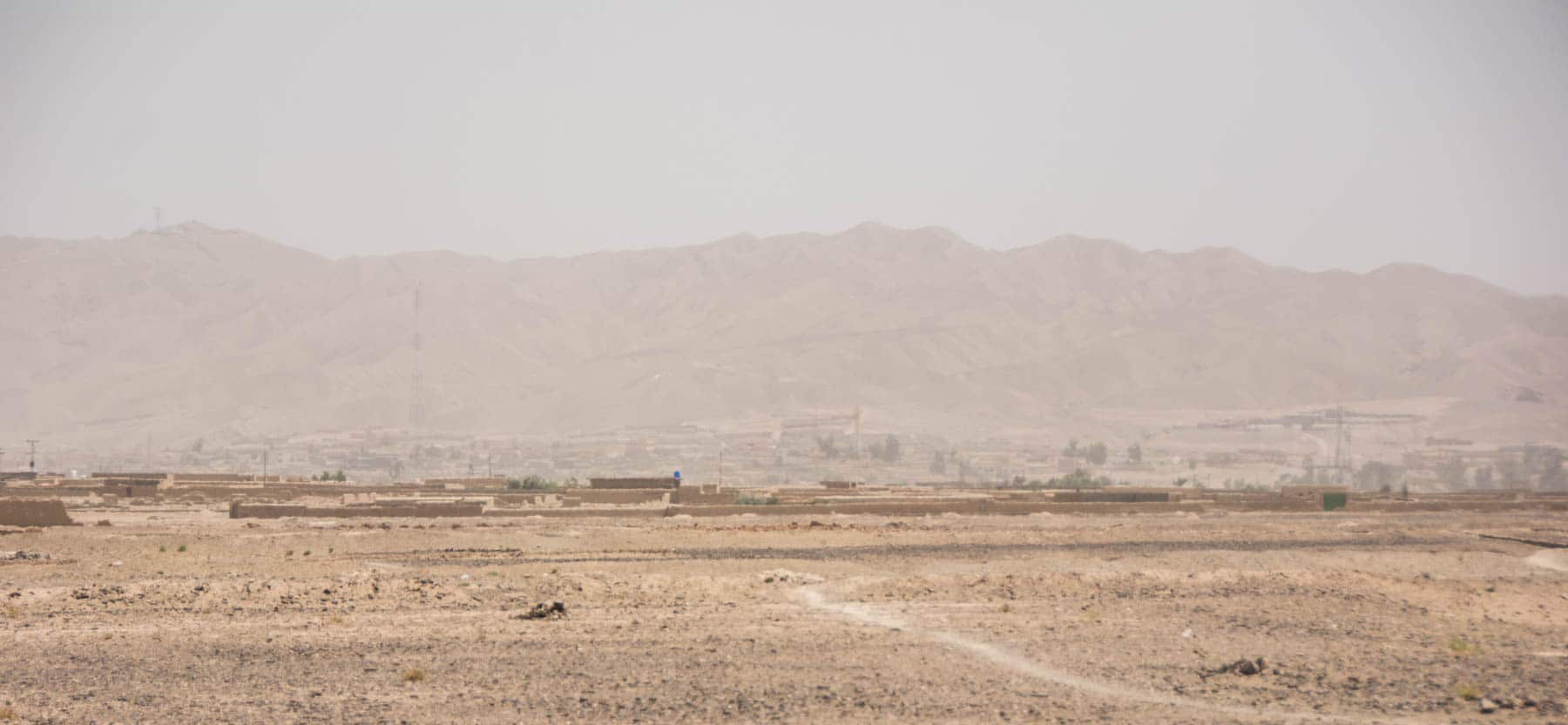
Nushki, the city city to the border of Afghanistan.
A billion and one transfers later, our limp, dusty bodies are finally placed into the custody of the Quetta police. We’ve made it to shining Quetta, home of the Taliban Toppers and the place to be for police officers looking to be killed in a suicide bombing. Remind me why we’re being escorted by police, again?
The police drive us into town in a covered truck, accompanied by armed men on motorcycles. We peer through the back awning, and the third world stares back. There’s trash strewn everywhere, donkey carts clopping through the streets, and wall-to-wall rickshaws and cars, all attempting to out honk each other as they swerve through the streets in a kind of organized chaos.
Wide-eyed stares penetrate the chaos. At us? No, we realize they’re staring at the police… and running away. Um.
Like Moses parting the seas, the traffic in front of us clears as rickshaws and food carts hasten to avoid the police truck. The officers get out to enforce the message. One rickshaw driver ventures dangerously close to our motorcade. The rickshaw driver shouts at the policeman. The policeman kicks in the tail light of the rickshaw driver. The law has spoken.
We are deposited into our hotel-cum-prison, reportedly the only one to accept foreigners. It takes two days to get permission to leave the city, and in that time we’re not allowed outside unless accompanied by police. Reception informs us that the police will only come once, to drive us to the Home and Tribal Affair Office, so don’t get our hopes up about day trips any time soon. The hotel is overpriced and out of our budget, but on the bright side, it has a courtyard. At least we’ll have fresh air during our house arrest.
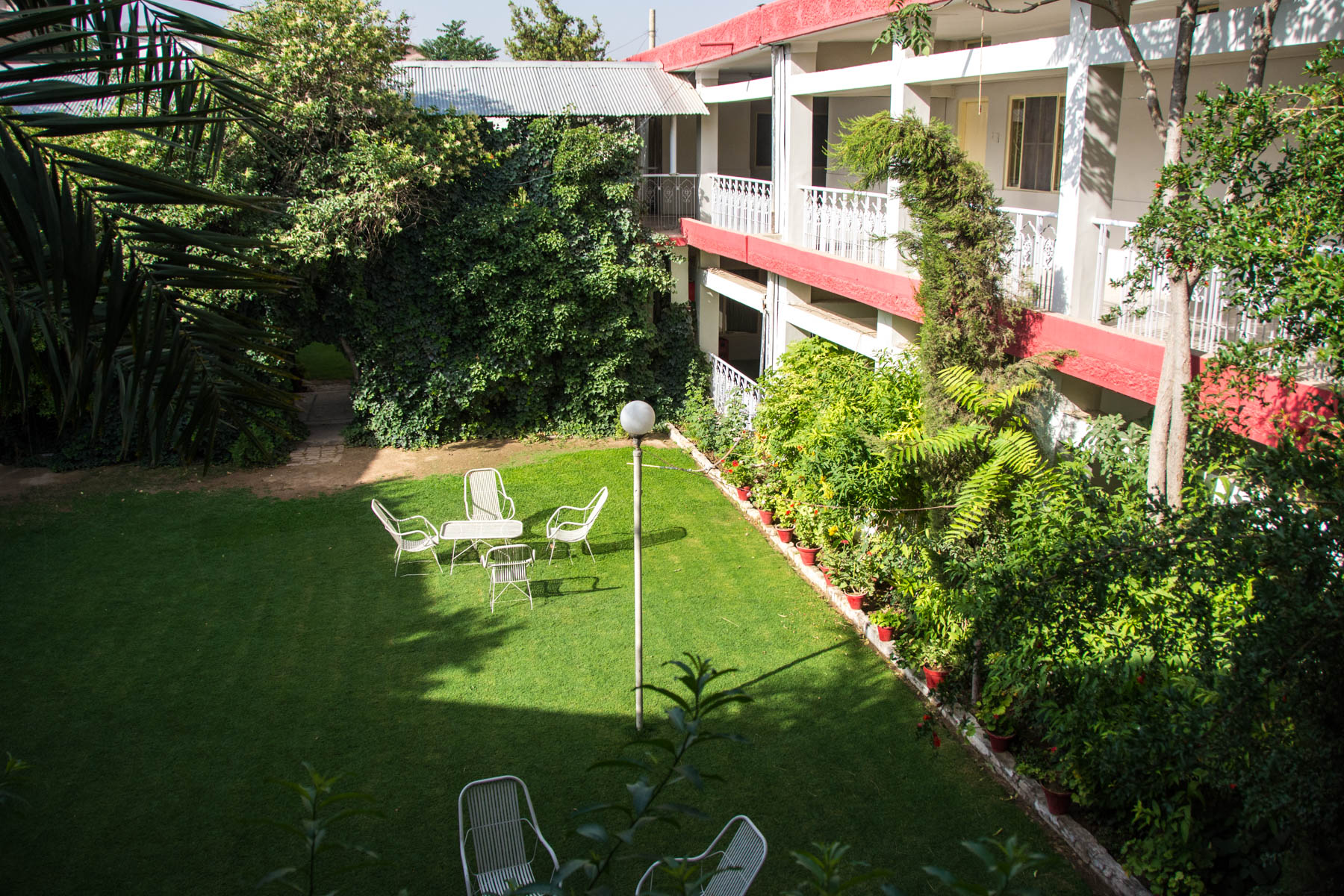
Home sweet house arrest.
Day 4 – 0.02 kilometers
Quetta
1 car, 2 rickshaws, 1 processing station
2 hours and lots of woe for one piece of paper saying we’re allowed to leave Quetta. On the plus side: free chai.
I spend the rest of the day being slowly killed by love and food by a 7-year-old Pakistani girl. While I read in the courtyard, she force feeds me gifts of cherries and samosas she purchases on the streets outside.
Day 5 – Freedom, sweet freedom!
Quetta to Karachi
1 rickshaw, 1 train
We’re on a stuffy train leaving Quetta station. The Levies are waving goodbye to us, and I smile outwardly and wave back. Begone, and good riddance. A police officer is watching us, but he’s only marginally intrusive, and has the biggest gun we’ve seen so far. He will do.
As the train chugs along its merry way through Quetta, I sigh with relief, and breathe deeply. Coal fumes, old sweat, and the stench of garbage rotting in the sun tickle my nose.
Ah. This is what freedom smells like.
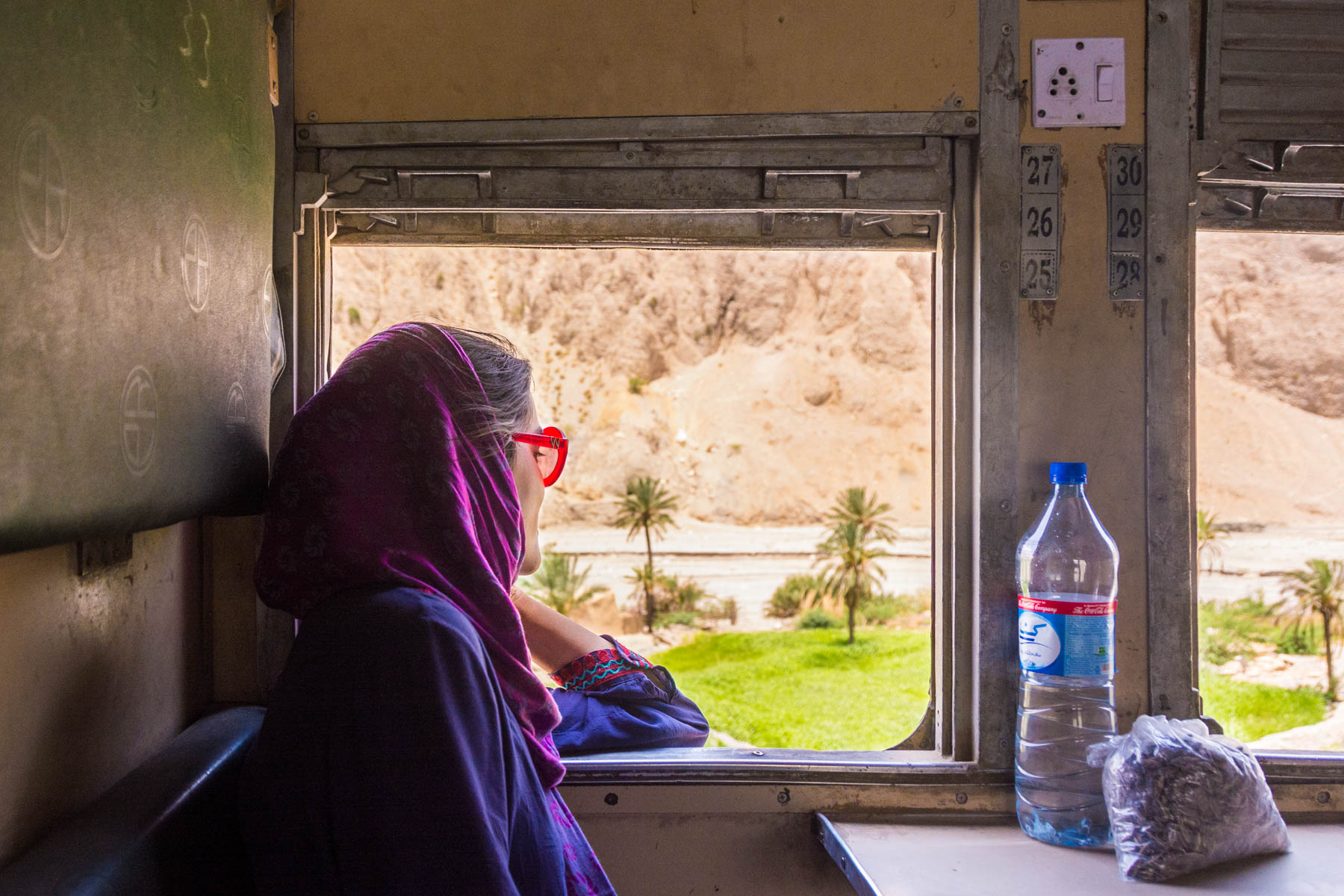
Free at last!
What was the worst border crossing you’ve ever had to do? Tell me in the comments!
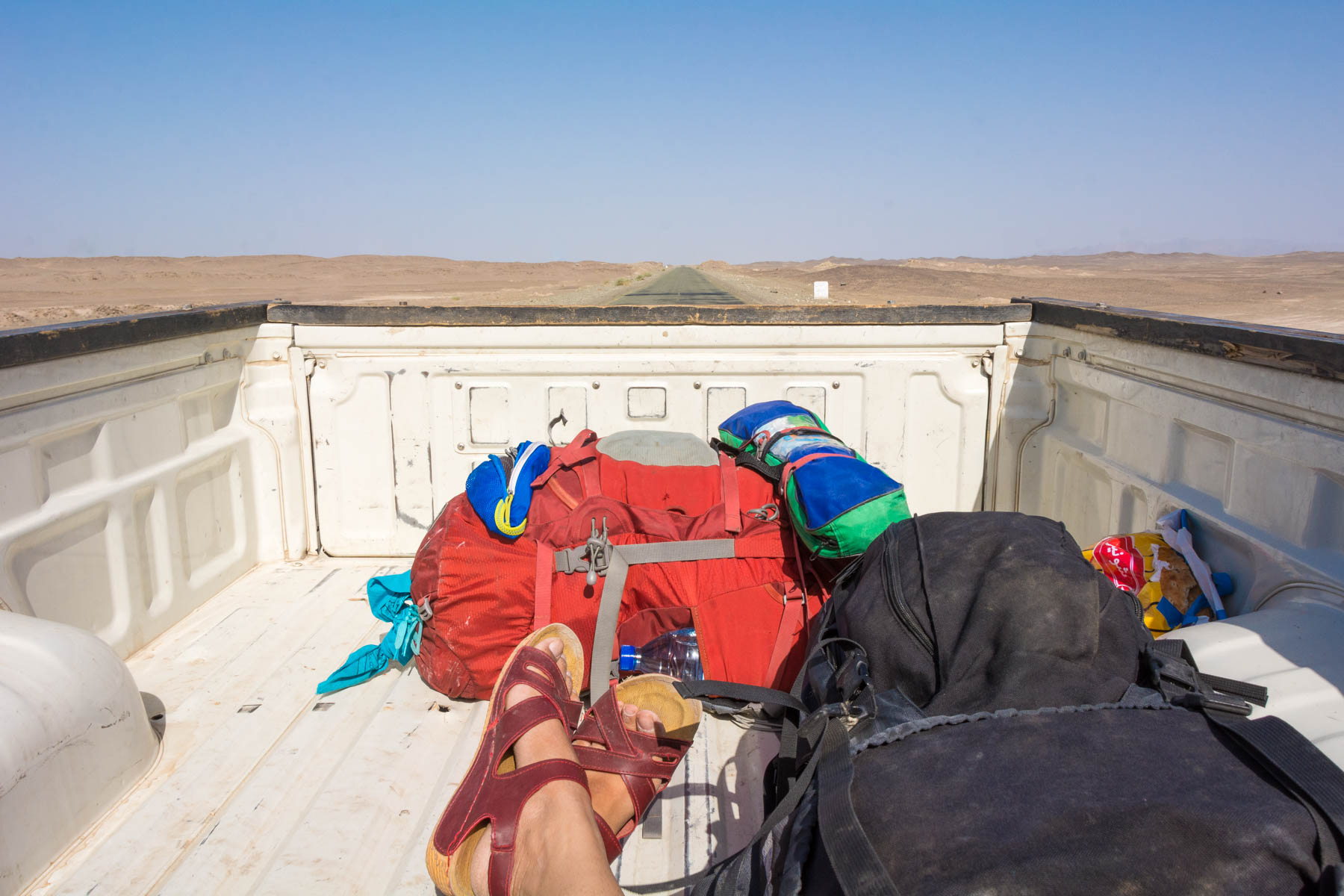
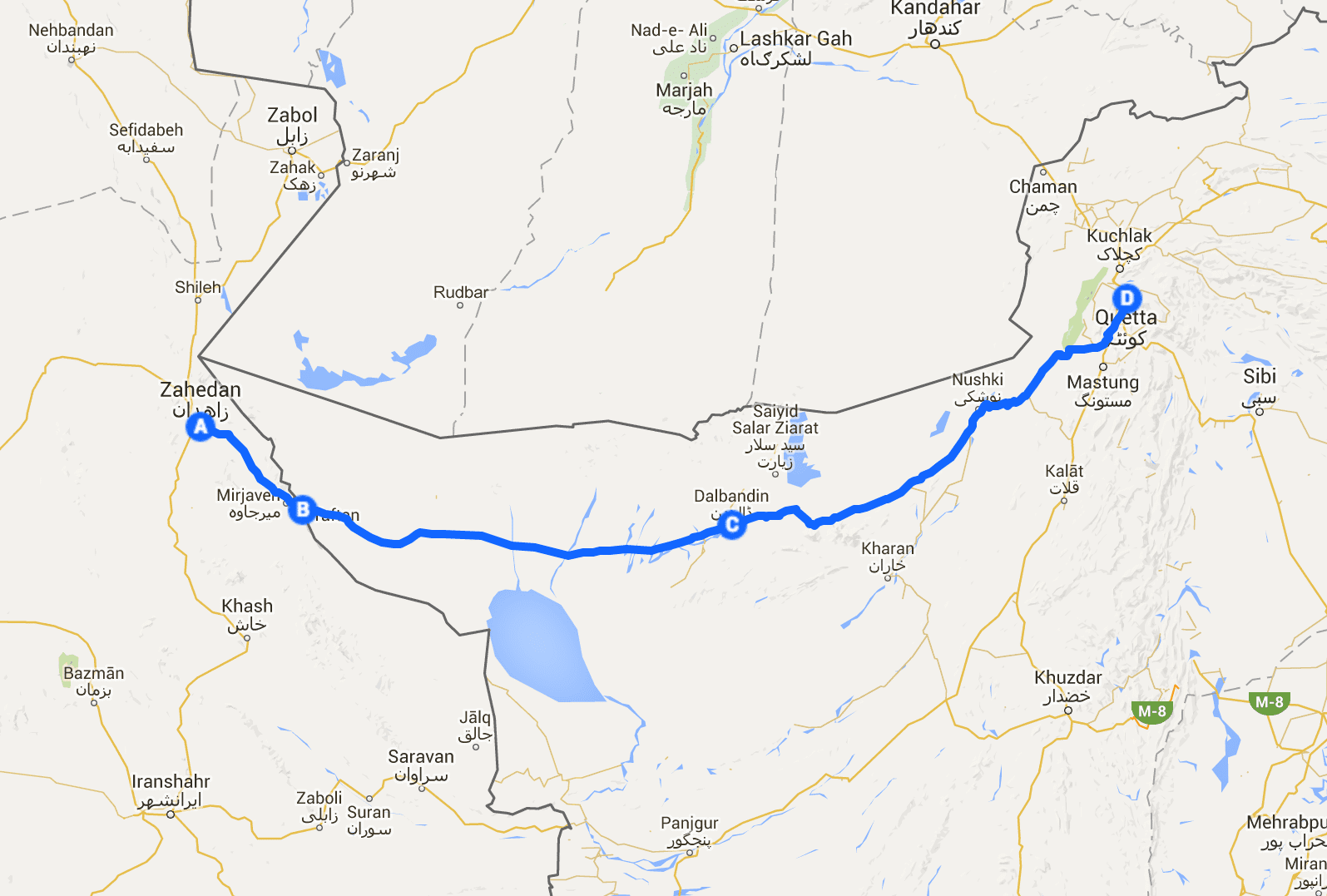
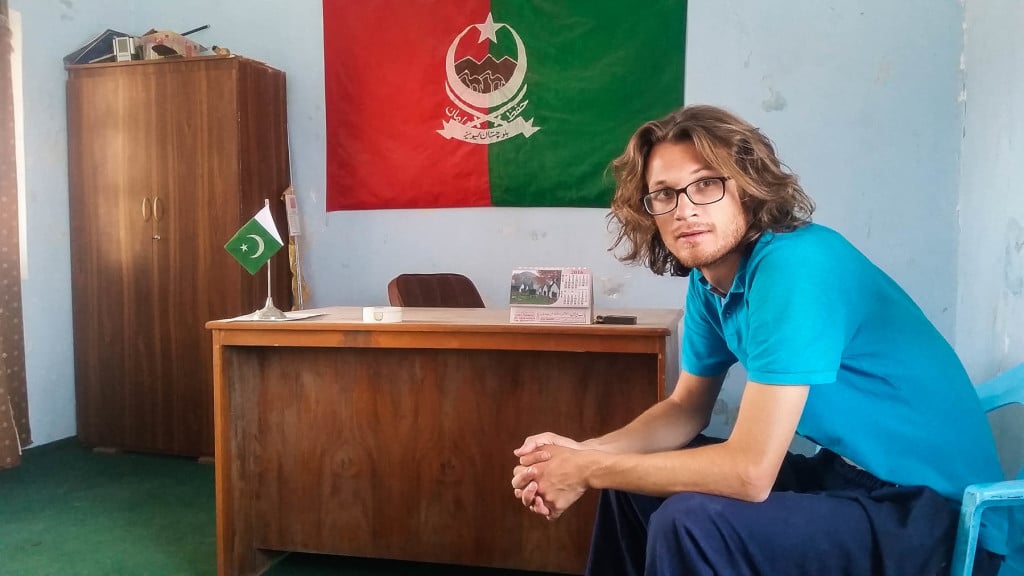
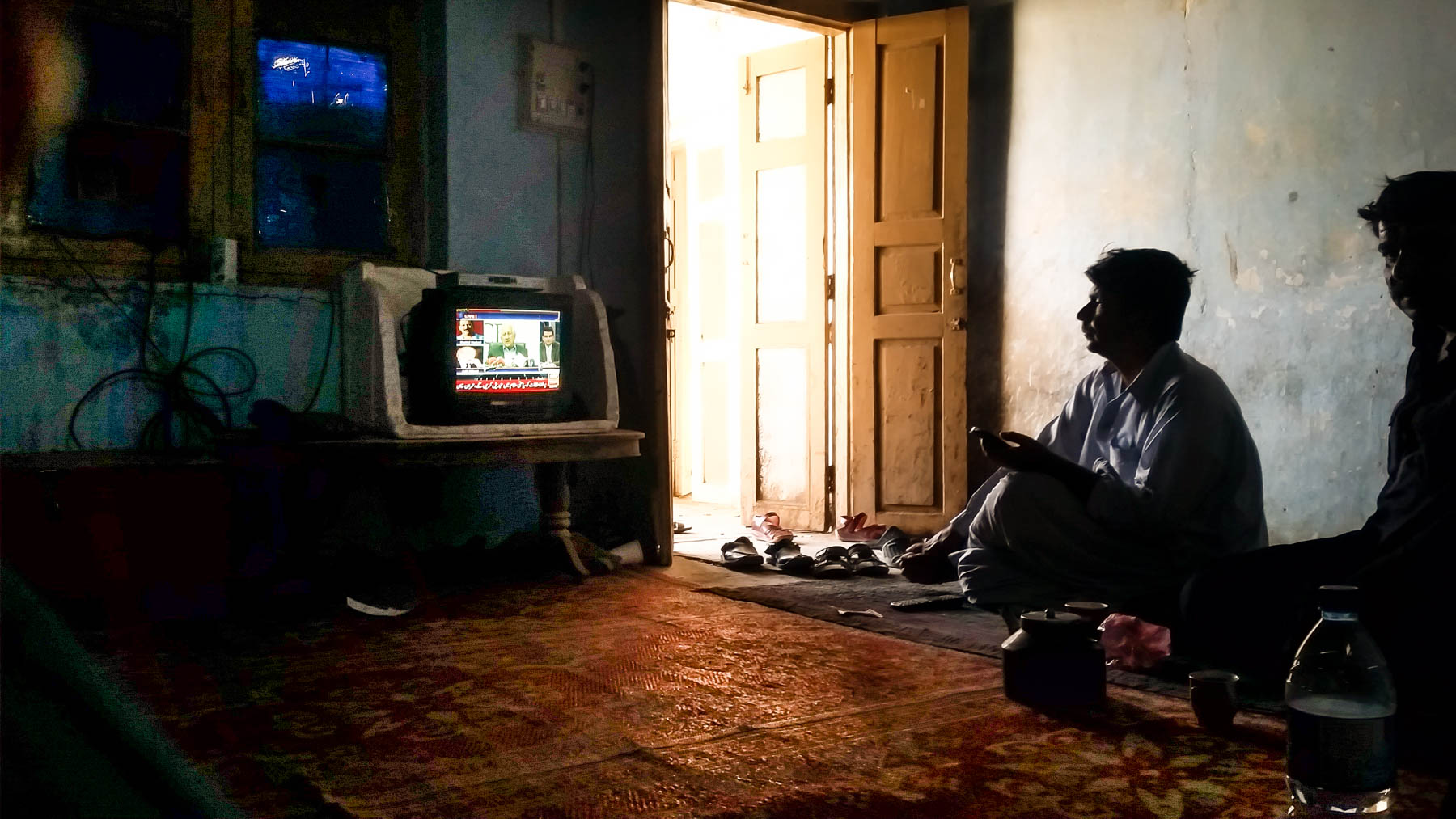
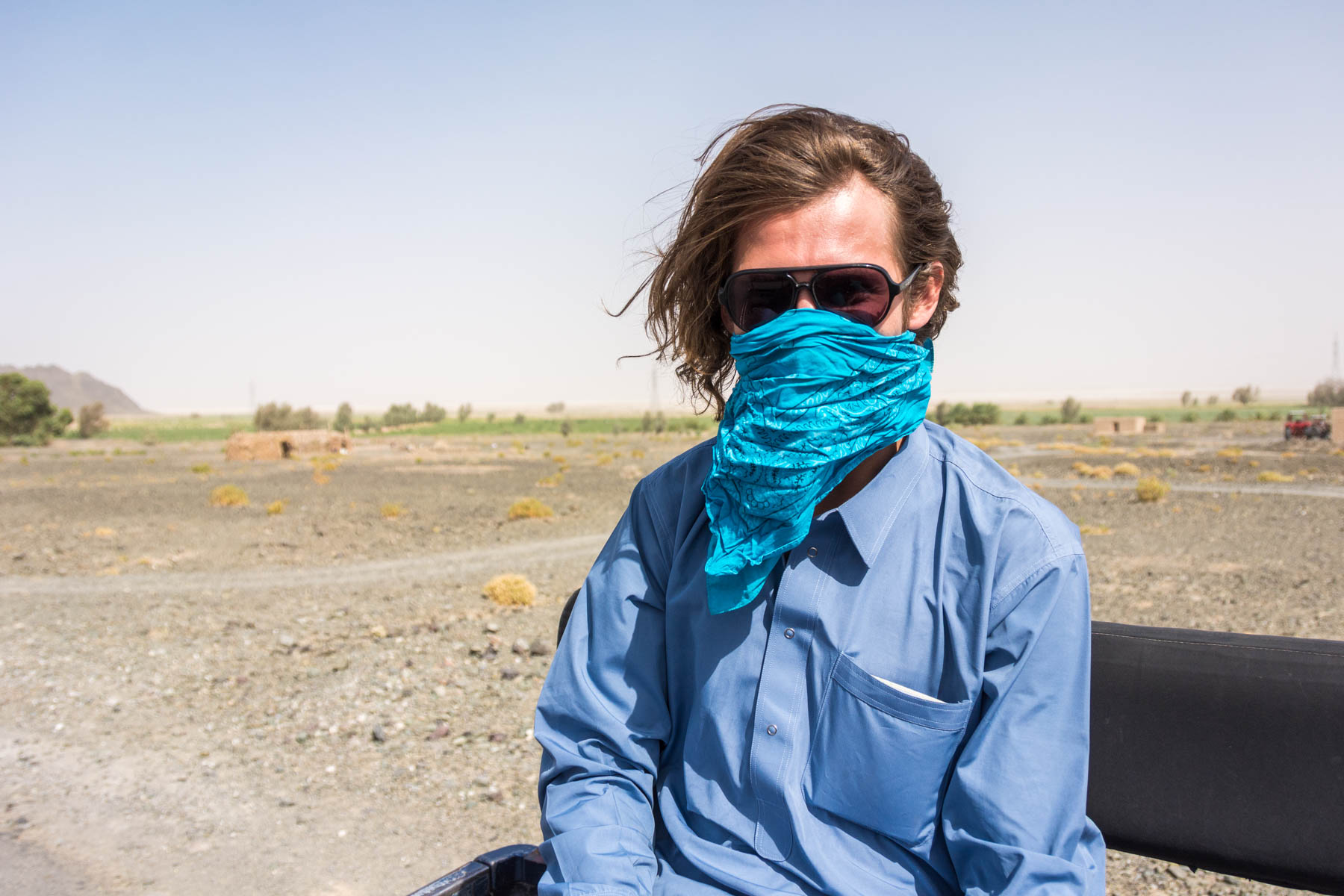
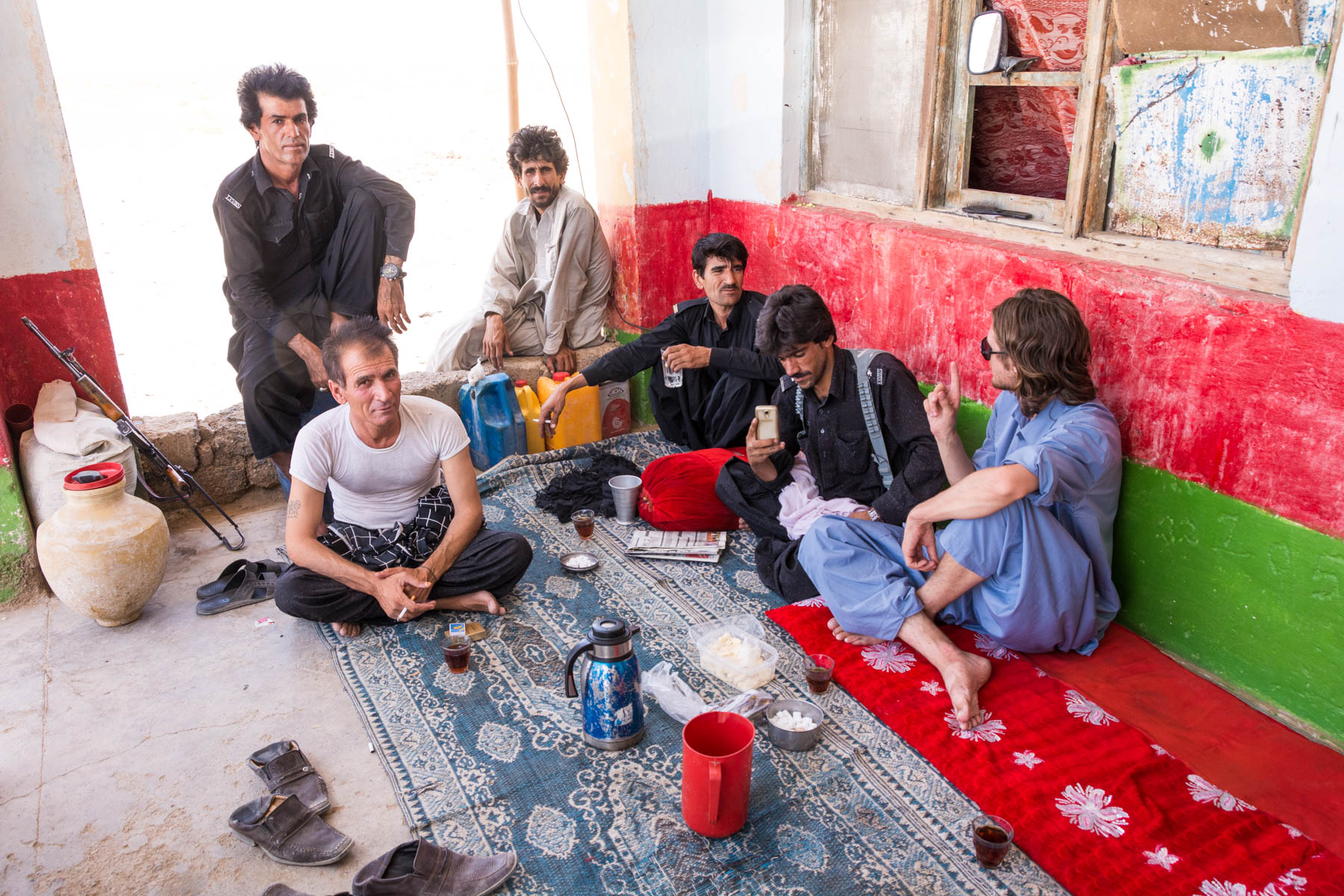
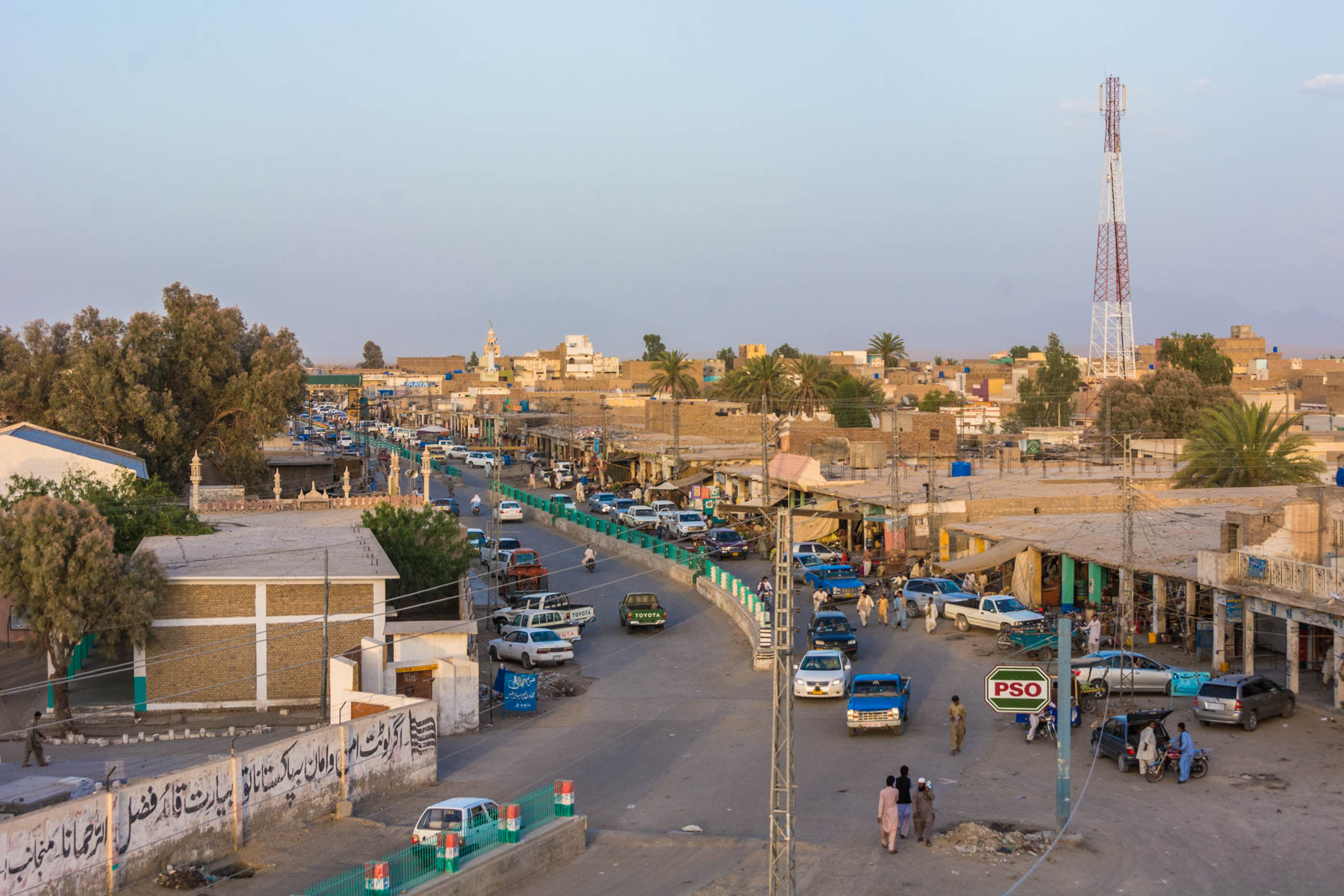
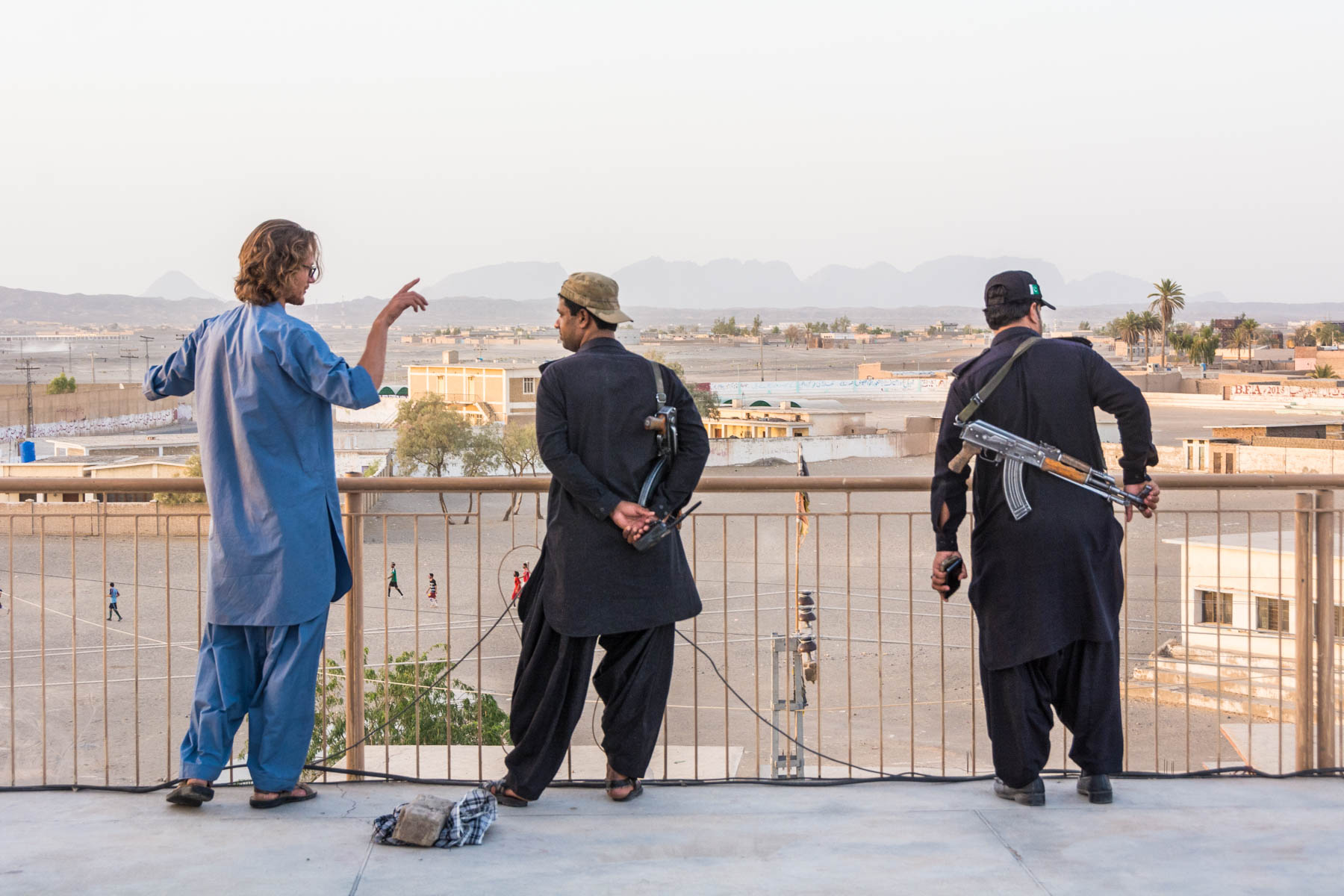
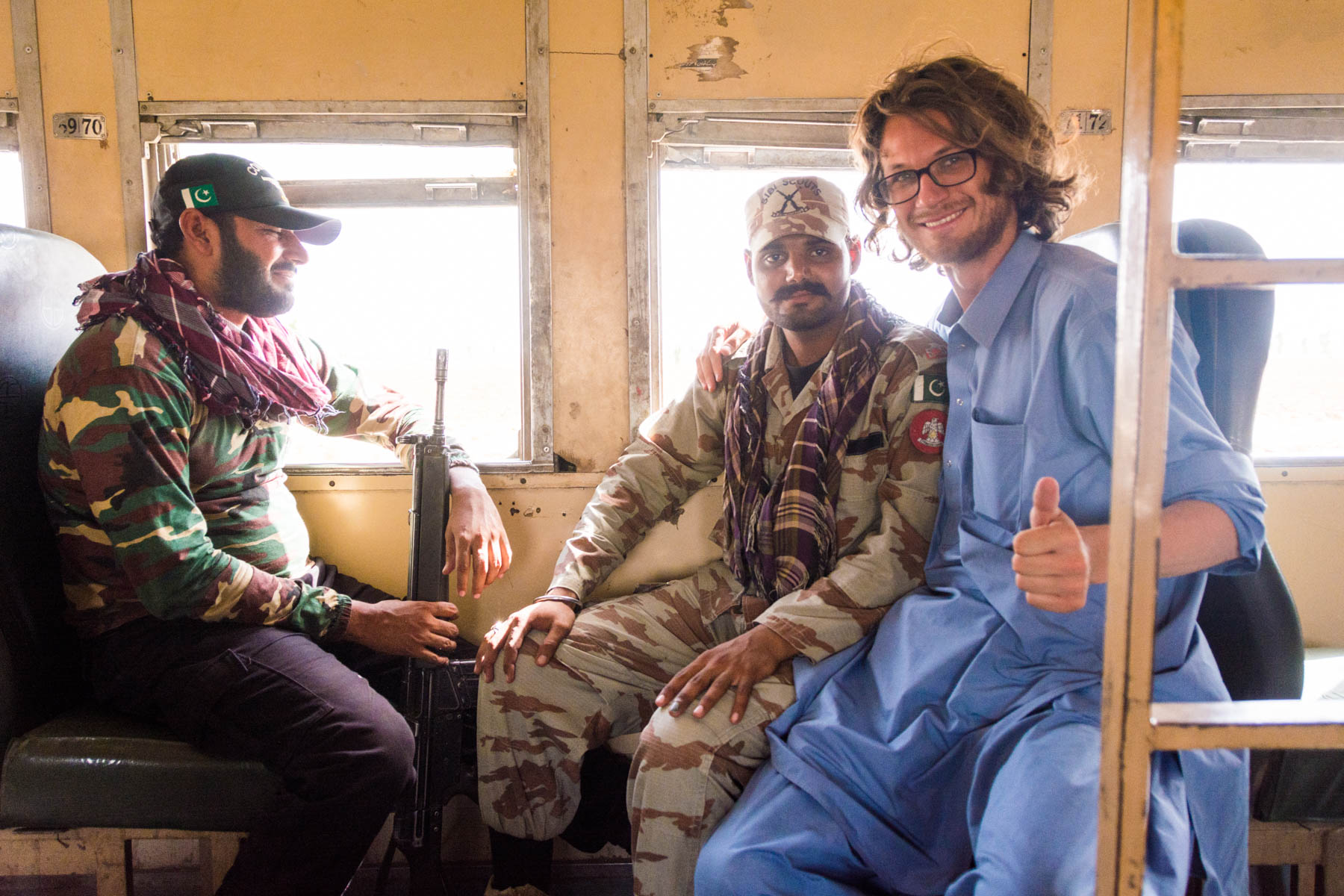
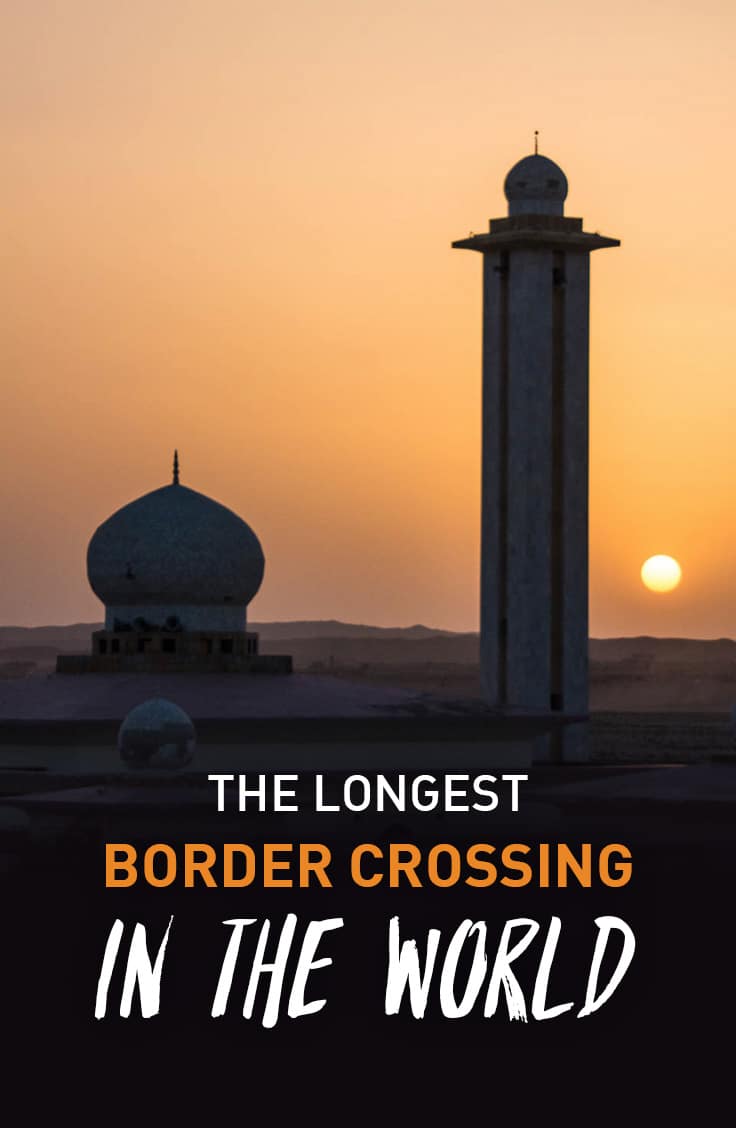


Hi!
Really enjoyable read 🙂
Only one addition I’d reccomend: one of my favourite aspects of Pakistan is the linguistic diversity. Perhaps you can use this great platform to highlight it. For example, calling baluchi a dialect rather than a language would be inaccurate. I apologise if there is such a post which I’ve just overlooked ????
Looking forward to more posts from you!
Regards
Hi,
I’m in the courtyard of Bloomstar hotel in Quetta, I was in Zahedan three days ago and have to wait for three more days to get my train to Karachi.
Exactly the same trip, but alone and without the heat. I even recognized some of the soldiers! I didn’t know nothing about the escort concept, my friends in Zahedan had only explained me about which bus to take in order to get to Quetta in one day (haha).
I just worried on the first night, in the unused office, when they weren’t planning to give me any blanket, mattress or food..
Looking forward to read your other articles. I’m staying 45 days in Pakistan too, I’d be glad if you have missions for me (Karachi, Moenjodaro, Islamabad, Penjab)
Thanks again for the smile!
Guilhem
Good luck, and say hi to the staff. Hopefully our articles will help you get some idea of what to do and where to go. And don’t worry, once you leave Balochistan things are much more pleasant travel wise. Cheers!
Hi,
Interesting account. And I tend to agree with comments already made by Mansur Ahmad. This blog is somewhat negative. You alluded to people taking your photographs, possibly as “masturbatory material”. Did it occur to you that you are as much of a curiosity for them as they are to you? When you visit their land, you take their photographs and show them to your friends and family. They see you as an alien and take your photographs to share with their friends and families.
Mansur is right that those levis are actually going out of their way to escort you. You should be grateful to them. People do get waylaid and kidnapped in those areas and you should be grateful that you didn’t.
I am also intrigued by your comments about cost of hotel. On one hand you post photos of garbage and poor people in those areas. On other, you complaint about paying $25 for a night and prefer a free night in a police post. And finally you complaint about lack of amenities in police post. You don’t want to spend money and then you want amenities (and weather) comparable to western countries.
I suggest that you keep travelling but keep an open mind about why your host country is doing something.
Hi there!
Thank you so much for sharing, lots of information :). And what an amazing trip you had!! I am in Turkey right now and I want to travel overland from Iran – Pakistan – India. I am just wondering what you recommend me as a female solo traveler? Is it safe to do this as a female solo?
I read the North is stunning because of the incredible landscape. Do you have to travel in Pakistan September, October or can you also travel here in October/November? I read in the North because of the winter it can be hard because roads can be blocked… Maybe it’s different in the south?
I am hesitating about the route because of tensions in this country. North looks really beautiful but can be dangerous now because of the tension in the Kasjmir.
I am curious about your thoughts and suggestions!
Greets,
Jet
In 1974 I did this trip. Three days wait for the bus at the tea shop two km. east of Zahedan. A nomadic tribe arrived set up camp nearby. Fires drums dance…. beautiful people. Forty km. in desert before we hit Pakistan border post. Guards not needed. Tough ride to Quetta but city nothing like you guys experience. Trippy young Baluchi lads so cordial. Gun merchants on tricycles patrolling otherwise free to wander. Sad it changed so much.
Wow, you seem like a horrible entitled Westerner. Please do everyone a favour and stop travelling
Maybe not the worst, but the most unlikely to succeed:
I booked my train tickets and accommodation, all the way from the Estonian capital Tallinn to Ha Nôi, through a small German travel agency (Travel Service Asia in Riedlingen). Asking the Laotian Embassy in Stockholm if it was possible to cross Laos from Viet Nam to Thailand I not only got visa application forms but also a list of tourist bureaus in Vientiane. By fax I booked and prepaid a car with guide to meet me at the Vietnamese/Laotian border at Na Phao, a town near the border on a road that I had found in my world atlas at home, on a map in scale 1:5 200 000. They confirmed that and the names “Na Phao” and “KM20”. Then I asked Travel Service Asia if they could get me a car to drive me from Vinh, where I intended to take the train from Ha Nôi, to the border at “Na Phao”/”KM20”. No, they couldn’t from Vinh, the car had to come all the way from Ha Nôi, so I might as well go by it from there to what they now called “KM20”/”Cau Treo”. After a while however, my Vientiane tourist bureau started to call the border point “Nam Phao” instead and that was also what was stamped in my Laotian visa. On the train from Dong Dang to Ha Nôi I got a very good road map of Laos, Viet Nam and Cambodia from a Vietnamese fellow passenger. On that I could neither find any “Na Phao”, “Nam Phao”, “KM20”, “Cau Treo” nor the road, that had been on my 1:5 200 000 scale map of my domestic world atlas. Suddenly it struck me that maybe the two border points didn’t lie wall-to-wall, how would I actually cross the border? It could be kilometres of no man’s land! My Vietnamese guide on the Ha Long Bay tour said I probably would have to walk. I told him I couldn’t do that with my heavy suitcase and shoulder bag. He told me he had fetched an English tourist, crossing the border from China that way, and he had to walk between the check points, but agreed upon that the driver would drive me to the Laotian check point if he was allowed to. Anyway, the driver claimed it would take 11 hours to Vinh and wanted to start at 6 o’clock. I said “No way”, as far as I knew there was nothing to see in Vinh anyway, so we left at 9 o’clock. We arrived at Vinh at 2 p.m.!! According to various guide books Viet Nam was supposed to be dirty and full of cockroaches. My hotel in Vinh looked just as inviting as the old Soviet hotel I lived at in Murmansk in 1978, very primitive, but clean all right, and the food was just as wonderful as I had experienced in Ha Nôi.
I had arranged with the Laotians that they should pick me up at the Laotian checkpoint at 11 o’clock, so I wanted to be at the Vietnamese checkpoint at 10. Then the driver said we had to leave Vinh at 6 a.m. So we did and arrived at the checkpoint at 8. This was the only rainy day of my entire journey. No problems with the Vietnamese customs and my driver was allowed to drive to the Laotian checkpoint, I just had to go to the passport police officer and get my passport stamped. “No”, he said, “you only have a visa to leave Viet Nam by air from Ha Nôi or Sai Gon, you cannot leave from here.” I told him 1) my travel agent had applied for visa together with my pre-booked trip, leaving Viet Nam by car 2) I had a car waiting for me on the Laotian side (I hoped) 3) I didn’t have any air ticket and I certainly didn’t intend to buy one either. That made no impression on him. I just waited for him to tell me that I had to pay a fee. But he did not! And I thought, this could be dangerous, suggesting the bribe myself. However, somewhat cautiously I said, “well, I entered Viet Nam by train, and that was possible for a small fee”. “How much?” “20 dollars”, I answered. “30 dollars”, he said quickly and stamped my passport. But now the customs suddenly had become very interested in my luggage. However, when one of the youngest officers started to write down the series number of my camera, the superior officer had enough, closed my suitcase and said “Have a nice trip!”. I am extremely glad that my Vietnamese driver was permitted to drive me across to the Laotian checkpoint. It was one kilometre of mud, and raining! We arrived there at 9. The checkpoint building was deserted, only me and between ten and twenty local lorry drivers, who also wanted to cross the border, were in the building. At 10 o’clock the passport officers arrived and stamped my passport. I still never have had anything to do with any representative of Laotian customs, neither when entering nor leaving the country. Now the only excitement left was, had we agreed upon the same checkpoint, the Vientiane Travel Bureau and me? And yes, twenty minutes to eleven they were there, not only one but two guides and a driver, and we started one of the most beautiful trips I have experienced on a road. Shortly after the border we stopped in a small, picturesque village, called Na Pe. I checked my world atlas when I came home; NA PE IS NOT AT ALL ON THE ROAD IN MY WORLD ATLAS, IN FACT THERE IS NO ROAD PASSING NA PE IN MY WORLD ATLAS. I HAVE MADE AGREEMENTS SEPARATELY WITH THE VIETNAMESE AND THE LAOTIANS TO SET ME OFF AND PICK ME UP RESPECTIVELY, AT QUITE ANOTHER BORDER PASSING POINT THAN I INTENDED!! And both sides misunderstood me in the same way. Sometimes you just are lucky!
My worst border crossing was rather this:
…..Then started a railway journey I will never forget. I entered a through Vilnius – Berlin Lithuanian sleeping car after having passed the Lithuanian border control. After half an hour we stopped at Grodna, the only station in Belarus, i.e. border station both from Lithuania and to Poland. The day before a Lithuanian travel agency had phoned the Belarussian Embassy for me and was told I needed no visa for the transit. In spite of that I was forced off the train with all my luggage. The Soviet-style immigration officer even wanted me to carry my luggage up to the visa office at 2nd floor of the railway station, but I planted my suitcase on the floor and said NYET! So he had a soldier watching my luggage while we visited the visa office. The visa was US$ 30.-, just as much as my Russian double transit visa Finland-Vladivostok/Mongolia-Latvia. Then the Belarussian customs searched all my luggage – I was passing the country for a mere half an hour!! But the worst part of the journey had yet to come. After the change of wheelsets on the Polish border station the conductors of my sleeping car and the through Russian St. Petersburg – Berlin sleeping car started to nail the exit doors and the door to the Polish cars in our train with wood and nails. Why? Because they were used to groups of 8⎯10 Russian armed criminals robbing their countrymen without the Polish police doing anything about it. My compartment fellows, a Russian couple, put a ladder against our door and tied the security chain around a newspaper. It was an awkward but unrealistic feeling waiting to be robbed during that night! Well, we woke up at the German border without that having happened.